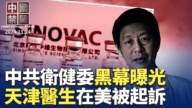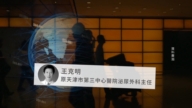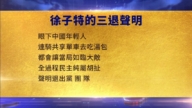【新唐人2011年5月25日讯】最近,路透社《热点透视》专栏主编雨果.迪克森,发表了一篇分析中国经济的文章。他认为,在当今中国,“太子党”、官僚阶级,以及国有企业的管理层这些“裙带阶层”,给中国经济乃至中国社会带来了非常大的祸害。下面,请看专家是怎么分析这个现象的。
雨果.迪克森在这篇文章中,把在中国存在的裙带阶层分为:在社会经济等级最顶端的“太子党”、 其次是,用纳税人的钱或通过受贿过着暴富生活的“官僚”阶级,以及,瓜分了国有企业经营成果的“管理层”。
谢田中国问题专家、美国南卡罗来纳大学艾肯商学院教授:“在中国经常说,所有最重要的经济领域,所有最重要的国营企业,从电力、银行、金融、到无线通讯,手机通讯,通讯,还有计算机网络,现在都是共产党,也就是我们所说的“太子党”在全面操控着。这对老百姓来说,是不公平的。
目前,在网络上流传着一个最新的“中国太子党资产”排名。排在榜首的是中国中信集团董事长王军,他是“前中共副主席”王震的儿子,公司市值7014亿元;第二名是江泽民儿子江绵恒—-中国网通创办人,公司市值1666亿元,此外,朱镕基女儿朱燕来、前总理李鹏儿子李小鹏,女儿李小琳,和胡锦涛儿子胡海峰,以及温家宝儿子温云松都榜上有名。
雨果.迪克森在文章中这样描述“太子党”:他们是重要党政领导人的子女,通过人脉交易,成为千万甚至亿万富豪。
草庵居士经济时政评论家:“中国尤其像最近这几年经济发展,我们看到,整个经济发展它并不是以公众经济、公共企业来发展,而相反,是由于大量的家族式企业,而这种家族企业又以利益集团,比如说太子党、权贵阶层相互关联而造成更多的腐败,整个经济就会出现很多无谓的消耗。”
草庵居士认为,裙带关系还会打破贫困阶层、中下层甚至包括中产基层,想依靠公平竞争、靠实力来上升的通道,这与西方资本主义自由竞争的经济体制是不相符的。他表示,“裙带资本主义”会对中国的发展造成非常大的阻碍。
雨果.迪克森认为,中共当局其实很了解这些问题。但既得利益者希望维持现状,与老百姓高涨的不满情绪水火不容。
那么,中共是否会对这些“圈内人”开刀,以平息民愤呢?
谢田:“这不可能。我们知道,中共这些太子党在经济领域兴起,和在政治领域、军事领域兴起是同步的。中共到现在为止,第二代、第三代领导人他们自己这样做,做为一个战略目标,巩固自己的权力,并且巩固自己在持续,下台以后还能继续享有、保有特权,所以这是他们的自己切身利益所在,他们是不会对自己的孩子开刀的。”
草庵居士认为,中国的裙带资本主义问题只能靠法制来解决,靠人治很难解决这些问题。
草庵居士:“所有这些问题要解决,完全要靠制度性来解决。当然,某一方面,比如说,会拿一些“示威”的事例,或者是他们已经‘下台的一些相关利益者’来解决问题,但是从根本上解决,我们要寄托于制度性,要寄托于全民的选举和民众公众的监督。”
谢田和草庵居士都认为,中国的裙带资本主义现象的根源在于中共的独裁垄断,而裙带资本主义带来的腐败导致了巨大的贫富悬殊,而贫富分化会造成族群间的对立、阶层间的对立,将会诱发重大的社会危机。
雨果.迪克森的文章也提到,中国经济中既得利益泛滥,自由言论又被压制,两者结合成了爆炸性的混合物,跟穆巴拉克统治下的埃及相似。而“阿拉伯之春”的一个教训就是,当民众认为统治者及其亲信在不当谋利时,他们就会躁动不安。
新唐人记者李静、萧宇采访报导。
China’s “Princelings” Economy
Reuters Breakingviews columnist Hugo Dixon’s
recent article on China’s economy points out
that the “class” system in China
is causing inequality
and hurting the economy and society.
According to Hugo Dixon, China’s “class” system
operates on several levels: at the top
of the socio-economic scale are the “princelings,”
children of CCP'(Chinese Communist Party) officials;
then are bureaucrats, who enjoy luxury lifestyles
funded by the people’s taxes and bribes;
and finally those who run state-owned enterprises.
Prof. Xie Tian at University of South Carolina:
“In China, the most critical industries
and the most important enterprises,
from finance to telecommunication and Internet,
are all controlled by the CCP,
their so-called “princelings,”
which is very unfair to the people.”
The newest online ranking of China’s “princelings”
puts Wang Jun, son of former CCP vice-chairman
Wang Zhen, in first place. Wang Jun is a president
of the Citic Group, a company worth RMB701.4billion.
The second place is held by Jiang Zemin’s son
Jiang Mianheng, who founded China Unicom,
a company now worth RMB166.6 billion.
On the list are Zhu Rongji’s daughter Zhu Yanlai,
Li Peng’s son Li Xiaopeng and daughter Li Xiaolin,
Hu Jintao’s son Hu Haifeng,
and Wen Jiabao’s son Wei Yunsong.
Dixon described these “princelings”
as “children of important party officials,
who have become multimillionaires
by trading on their contacts.”
Analyst Caoan Jushi: “In recent years, we see
that China’s economic development is not based
on the growth of public companies,
but on large family enterprises. Such enterprises
are controlled by interest groups,
such as “princelings,” resulting in corruption
and wasteful consumption of economic resources.”
Caoan Jushi believes that interest groups
will also suppress working’ and even middle classes,
making it impossible to succeed by fair competition
as in Western capitalist development.
Therefore, “crony capitalism” is a great obstacle
to China’s development.
According to Hugo Dixon, the CCP is well aware
of these problems. But interest groups wish to keep
the current state against people’s interest.
Xie Tian: “It’s impossible. We all know
that the princelings economic success
is connected to their political and military power.
The CCP has continued such a pattern
through the second and third generation leaders
with the goal to strategically reinforce
and extend their power. It is of their own interest,
they’ll never take actions against their children.”
Caoan Jushi thinks China’s crony capitalism problem
can only be solved by law, not by the leaders.
Caoan Jushi: “All of these problems
require systematic solutions. Of course,
in certain cases, they may take actions against,
like some interest groups no longer in power;
but to solve these problems from their roots,
systematic and public supervision is needed.
Both Xie Tian and Caoan Jushi believe
that the cause of China’s crony capitalism lies
in the monopoly of the CCP. Such crony capitalism
results in great social gaps and conflicts,
which will trigger severe social crises.
Hugo Dixon wrote in his article:
“China’s economy is riddled with vested interests,
while free speech is suppressed.
This potentially explosive mixture sounds similar
to Hosni Mubarak’s Egypt…
One lesson from the Arab Spring is that
populations grow restless when they think rulers
and their cronies enrich themselves unfairly.”
NTD reporters Li Jing and and Xiao Yu




























